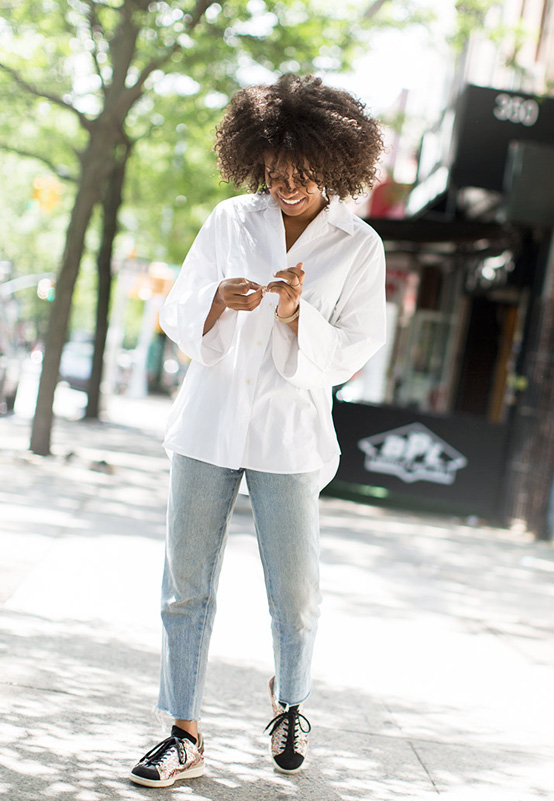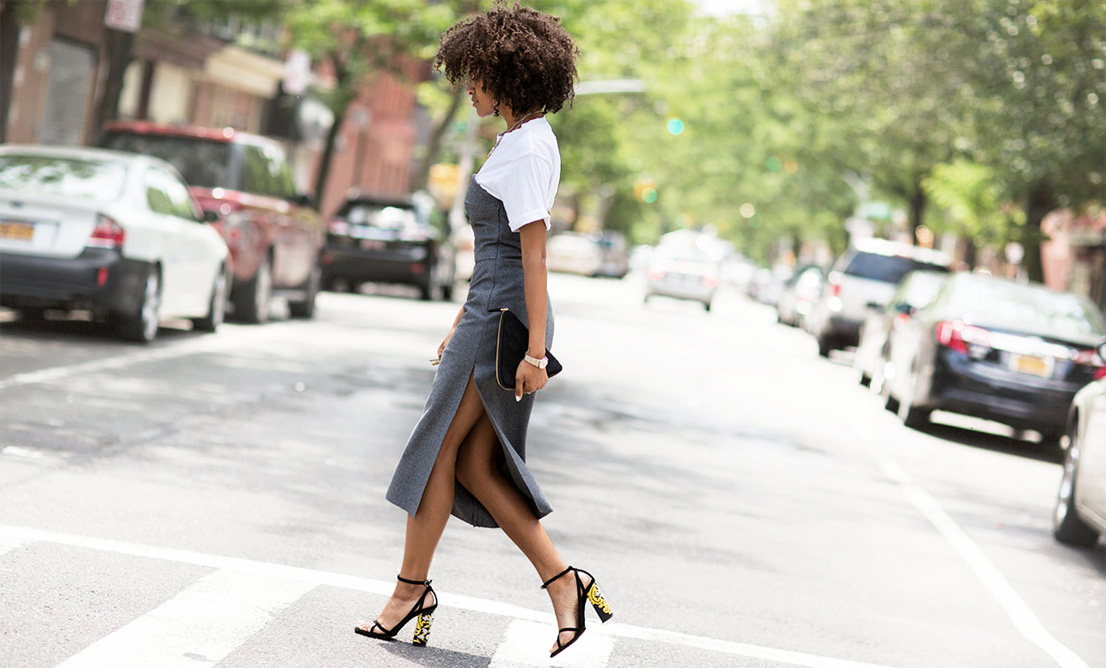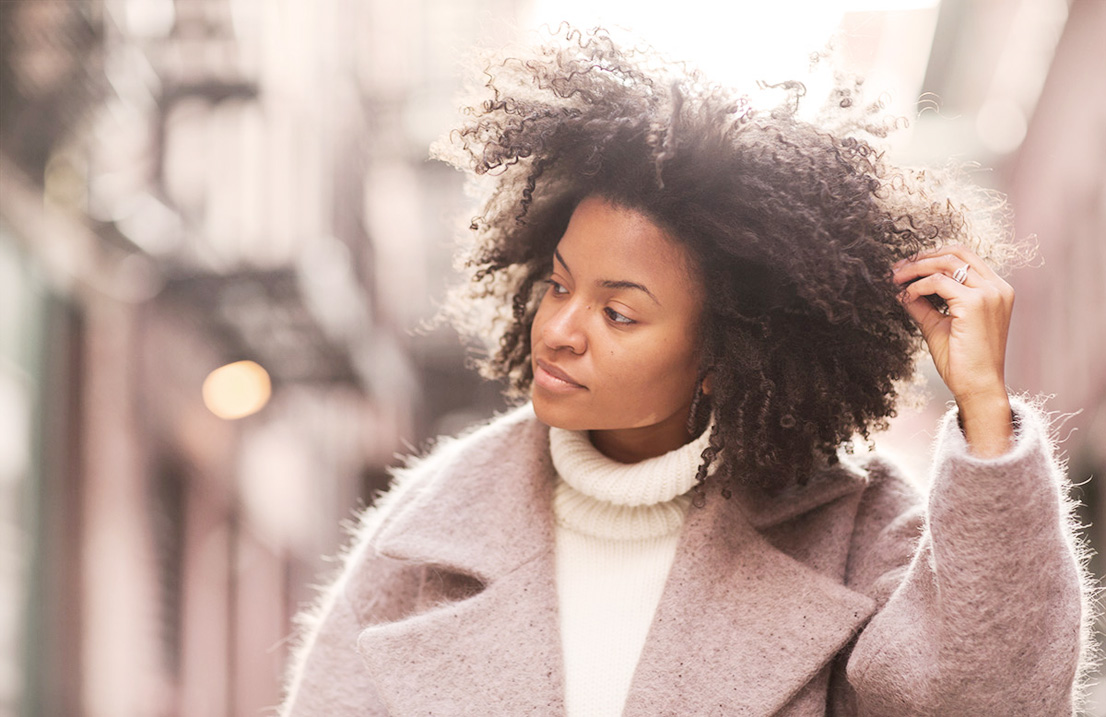I’ve always wanted curly hair. Don’t ask me why but I have. Solange Knowles is, and has always been, one of my favourites so that probably has something to do with it. But here’s the thing: for as long as I can remember I’ve always suffered from a serious inferiority complex when it comes to my hair. Unless you’re part of that small breed of blessed people who really do manage to rock the whole “I woke up like this” look, at some point, you’ve probably felt the same. Only mine manifests itself in ways that see me gravitating towards styles and textures the polar opposite of my own.
To give you a bit of background here for a second, I grew up surrounded by friends who were all beautiful, smart and funny, with either easy, straight hair or at least tameable curls. Thanks to my South African roots, I was pretty much the only one in my social group with seriously unmanageable hair (thanks mum). Dramatic, perhaps, but it’s true. The first hairdresser she took me to would go out of her way to point out how difficult my hair was each and every time my mum would collect me. 15 years on, just the sheer memory of it alone makes me cringe with embarrassment. It was too much shame to bear as a teenager so I stopped going to the hairdressers altogether, resorting to straightening my hair at home in a hopeless bid to tame it.
[show_shopthepost_widget id=”1055568″]
The romantic notion of having a head of wavy, carefree locks had me sold but it turns out, while true, with curly hair comes great responsibility. “Throughout my teens and twenties, I hated my hair and spent so much time and money straightening it,” says Michelle Scott Lynch, the force behind curl-focused beauty brand, Bouclème, not to mention my hair inspo. “I wanted the poker straight look that was all about having smooth and sleek hair. When I was growing up, there was no one talking about curly hair and how to look after it,” she adds. “Hairdressers still aren’t trained to cut and manage curly hair other than blow-drying it straight. The Internet changed that.”
The change she’s referring to is the embrace your curls movement that’s happening right now or even, more generally, the movement to embracing the natural texture of our hair full stop. “Curly women started to use the Internet to share their struggles and tips on how they look after their hair because before then, we didn’t have anywhere to go. Sites like Naturally Curly and British Curlies were a lifeline when I decided to embrace my curls,” she says. “Now there are hundreds of vlogs and blogs out there and it’s all about celebrating your natural texture.”
See, that’s the thing about Bouclème: it’s not about eradicating your curls or taming them in the way that most curl-specific product lines do. Nor is it here to mess with your natural curl pattern, infuse your strands with nasties or make you drop serious £££ in one fell swoop either. Quite the opposite, in fact. Each piece on the range comes with ingredients like Aloe Vera extract and Linseed to hydrate, soften and smooth the hair cuticle to enhance your curl formation and all of them are packed full of coconut and argan oil and completely free of nasties.
[show_shopthepost_widget id=”1055500″]
“I’m a big fan of all things natural – they’re are a key part of my life and at the time, I couldn’t find anything here in the UK for curly hair that were enhanced your curls while also being free from sulphates, silicones, parabens and PEGs,” Michelle says. “Most of the lines were American and scented with sickly sweet synthetic fragrances, which I loathe. So after an incredible trip to a curly hair salon in New York, I felt it was time the UK upped it’s curl game and decided to create my own.”
With all of that in mind, we quizzed Michelle on everything from the products to avoid and curly hair health to maintenance and styling. And trust me, when Michelle tells you to sleep in a silk headscarf, you sleep in a silk headscarf. The fact that it’s McQueen, well, that’s just par for the course.
 On the importance of moisture: Curly hair tends to naturally be drier than other hair types and frizz is a sign that hair lacks moisture. With proper hydration frizz will transform into a curl. Two ingredients that perpetuate the problem of dry frizzy curls are sulphates and silicones. One strips the hair of all protective oils and the other, a non-water soluble plastic film former, gives the illusion of smooth and sleek hair but prevents much needed moisture from entering the shaft. The only thing that can remove silicone is sulphates so it becomes a vicious circle of curls being dried out by sulphates and requiring more silicone to fix it.
On the importance of moisture: Curly hair tends to naturally be drier than other hair types and frizz is a sign that hair lacks moisture. With proper hydration frizz will transform into a curl. Two ingredients that perpetuate the problem of dry frizzy curls are sulphates and silicones. One strips the hair of all protective oils and the other, a non-water soluble plastic film former, gives the illusion of smooth and sleek hair but prevents much needed moisture from entering the shaft. The only thing that can remove silicone is sulphates so it becomes a vicious circle of curls being dried out by sulphates and requiring more silicone to fix it.
Some of my tried and tested tips are experiment with leaving some or all of your conditioner in – this will hydrate curls and banish frizz. Weekly deep conditioning for dry thirsty curls also helps boost moisture levels. If your curls lose moisture quickly try adding a few drops of pure virgin coconut or argan oil (no silicone based oils) on top of your leave-in but before applying your styling gel. Layering products really helps lock moisture into curls longer.
On protecting your curls while you sleep: If your hair is long enough tie it in a pineapple on top of your head to prevent it tangling. Shorter curls may benefit from using a hairnet instead. Sleeping on a silk pillowcase is gentle on your skin and curls. Less friction equals less frizz. Alternatively, make sure to wear a silk bonnet or scarf to bed to keep your curls in tact.
On products to avoid: Look for products with a good balance of natural oils and humectants – these will keep your curls moisturised and defined. Avoid silicones, sulphates and petroleum/mineral oil based products as long term use can be drying on hair and also it weigh down.
On being patient: When changing to a new hair care system, allow for a period of adjustment particularly when changing from a SLS and silicone based one. The hair and scalp needs time to detox and rebalance before being able to see true benefits. Being unique individuals the period of time differs for each person. The health of your hair will improve every month with noticeable changes in shine, hydration and overall condition.



